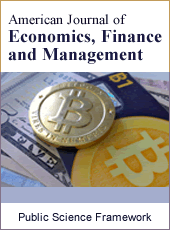American Journal of Economics, Finance and Management
Articles Information
American Journal of Economics, Finance and Management, Vol.1, No.3, Jun. 2015, Pub. Date: May 14, 2015
Choice of Accounting Policy: Effects on Analysis and Interpretation of Financial Statements
Pages: 190-194 Views: 5771 Downloads: 9690
[01]
Sunday Adebayo Alayemi, Faculty of Business and Social Sciences, Department of Accounting, Adeleke University, Ede, Osun State, Nigeria.
This paper examined the effect of accounting policy adopted by the reporting entity on the analysis and interpretation of financial statements. It is mandatory according to the Statement of Accounting Standards (SAS NO.1) and International Accounting Standards (IAS 1) for every reporting entity to disclose the accounting policy adopted in the preparation and presentation of financial statement. Accounting policies are very important for the proper understanding of the information provided in the financial statements. An entity should clearly state the accounting policies it has used while preparing and presenting the financial statements. Disclosure of accounting policies is important because many accounting standards allow alternative treatments for a same transaction or item. Users of financial statements will not be able to compare the financial information with other entities if the accounting policies are not cleared outlined. Therefore, by stating the policy adopted, this will make it possible for the readers and users of financial statements to make informed decision. The users will as well be able to see the impact of accounting policies on the income statement and financial position of the reporting entity within the industry.
Accounting Policy, Financial Statement, Reporting Entity, SAS, IAS
[01]
Alexander, D. and Britton, A. (2004). Financial reporting.7th edition, Thomas Leasing. High Holborn House, 50-51 Bedford Row, London WCIR4LR.
[02]
John, J.W. ;Subramanyam, K.R. & Halsey, R. (2007). Financial statement analysis.9th edition, New Delhi Tata McAraw- Hill.
[03]
Abubakar, Lawal (2007). Interpreting financial statement for decision making.Business day of June, p 13.
[04]
Olowe, R.A. (1998). Financial management concept, analysis and capital investment.LagosBrierly Jones Nig. Ltd.
[05]
International Financial Reporting Standards. International Accounting Standaeds, No. 1
[06]
International Financial Reporting Standards. International Accounting Standards, No. 16
[07]
Nigerian Accounting Standard Board. Statement of Accounting Standard No. 1
[08]
Fekete, S., Damagum, Y.M.; Mustata, R. ;Matis, D. and Popa, I. (1010). Explaining accounting policy choices of SME’s: An empirical research on the evaluation methods.
[09]
MacNeal, K. (1939)(Reprinted in 1970). Truth in accounting. Texas: Scholars book company.
[10]
Paton, W. A. and Littleton, A. C.(1940). An introduction to corporate accounting standards. Monograph No. 3. American Accounting Association.
[11]
Littleton, A.C.(1953). Structure of accounting theory. Monograph No. 5. Sarasota Florida: American Accounting Association.
[12]
Chambers, R.J. (1966). Accounting evaluation and economic behavior. Englewood Cliffs, N. J.: Prentice Hall.
[13]
Ijiri, Y. (1975). Theory of accounting measurement. Studies in Accounting Research. Sarasota, Florida: American Accounting Association.
[14]
Watts, R. L. and Zimmerman, J.L.(1986). Positive account ing theory. Englewood Cliffs, New Jersey: Prentice Hall.
[15]
Lev. B. (1977). The old rules no longer apply. Forbes: 34 – 6.

ISSN Print: 2381-6864
ISSN Online: 2381-6902
Current Issue:
Vol. 5, Issue 3, September Submit a Manuscript Join Editorial Board Join Reviewer Team
ISSN Online: 2381-6902
Current Issue:
Vol. 5, Issue 3, September Submit a Manuscript Join Editorial Board Join Reviewer Team
| About This Journal |
| All Issues |
| Open Access |
| Indexing |
| Payment Information |
| Author Guidelines |
| Review Process |
| Publication Ethics |
| Editorial Board |
| Peer Reviewers |


